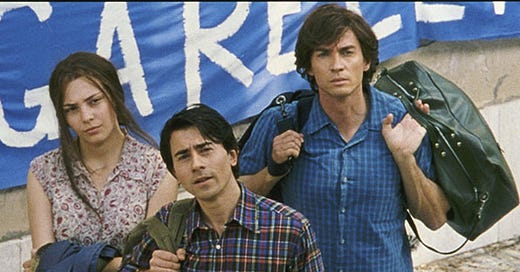Heroes of the Zeroes: The Best of Youth
Heroes of the Zeroes is a daily, alphabetical look back at the 365 best films from 2000 to 2009.
"The Best of Youth" Rated R 2003
“A percentage of life is difficult to cover,” goes a line in 2003’s “The Best of Youth” — an Italian-TV miniseries theatrically released stateside in 2005.
Oh, the irony of a quip like that in a 368-minute monument to discrediting that idea. That’s right, a 368-minute film broken into two acts across two DVDs, and originally made for television, the likes of which you wouldn’t find on any non-premium network here. Discouragement because of daunting length would deprive you of what is, unquestionably, one of the finest-ever, fully realized epics about family.
There’s not one indulgent moment, gesture or scene in director Marco Tullio Giordana’s film, which unfolded with a classic novel’s elaborate, eloquent care. Like a great book, length allowed “Youth” to let you live in its characters’ foibles, offering dramatic room to breathe, critical insights into characters’ behaviors and emotional payoffs and themes that felt nothing short of spectacular.
Spanning from college years in 1966 to the onset of old age in 2003, “Youth” chronicles intertwined emotional, social and political turbulence in the lives of Matteo and Nicola Carati, a fictional pair of Italian brothers.
Matteo (Alessio Boni, a dead-ringer for Billy Crudup) is book-smart but a restless and rebellious hothead leery of the establishment as he works at an asylum. Nicola (Luigi Lo Cascio, like a Mediterranean Thom Yorke with Jason Schwartzman’s frame) is a gregarious doctor-to-be with an eye on treating patients with pathos.
What’s intended to be a shared last-huzzah trip defines the rest of their lives, work and relationships — Matteo springs Giorgia (Jasmine Trinca), an abused asylum patient, and brings her along intending to return her to her family.
That event forever bonds these who diverge politically, form families and careers, enjoy love, suffer loss and participate in Italian history from Florence floods to Red Brigade terrorist attacks.
Giordana is keenly aware of how human and political tendencies share a formative pattern — both in electrifying, unforgettable instants, but also the almost-imperceptible accumulation of passing time.
Matteo’s deepening intimacy issues and distance from his family runs parallel to years of frustrating, futile investigations into Italy’s underworld as a cop. And when Nicola — an advocate for the mentally ill — sees his life with Giulia (Sonia Bergamasco) and a daughter become a toll of revolution, it’s a beautifully dramatized illustration of attempts to shape policy from two sides of an ethical line.
To say more about the narrative turns would spoil the sheer pleasure of learning where Matteo and Nicola find themselves as the years roll on. In the end, “Youth” sells us on the idea that life is a gift, good things can seem as natural as bad things, and that beauty and rejuvenation can come from even seemingly unbearable lows.
Yes, early life’s boundless enthusiasm and seeming indestructibility tarnishes over time. But the capacity of generations beyond our own to forgive and reconcile ensures that the best of youth can live on. The magnificent “Youth” chronologically covered half these characters’ lives, but it illuminated their totality.
There's no trailer link because A) they either lack English subtitles; or B) ruin the film's pleasures by giving too much away. Really, just rent it.



